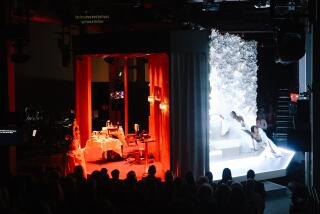TV REVIEW : O’Neill Clunker ‘Interlude’ Proves It on PBS
- Share via
Eugene O’Neill’s nine-act “Strange Interlude” ran for more than a year on Broadway in 1928, but there have only been a couple of major revivals. The Actors Studio did it in the early ‘60s and Glenda Jackson did it a couple of years ago in the West End and on Broadway.
To celebrate the O’Neill centennial, PBS’ “American Playhouse” is offering the Jackson version in three nightly installments, beginning tonight at 9 (Channels 15 and 28). After about half an hour, the viewer will understand why theaters steer clear of this script. It’s a clunker.
As usual, O’Neill was going for the heavyweight title here. He would achieve the intensity of drama and the density of the novel. He would combine the fatality of Greek tragedy with the 20th-Century discovery of the unconscious mind. His characters would say what their social masks dictated, then reveal what they were really thinking.
Rather than revivifying an ancient form, O’Neill came up with the first daytime drama. “Strange Interlude” looks strangely familiar on TV, with its wooden discussions of its heroine’s latest emotional tailspin. But its real home would have been radio. “And now . . . The Right to Happiness.”
Jackson plays Nina Leeds, who foolishly neglected to give herself to her football hero sweetheart, Gordon Shaw, before his dear little biplane went down in flames during the Great War. (There’s black-and-white footage of this under the credits, one of the broadcast’s few attempts to open up the play.)
Nina has devoted the rest of her life to punishing herself for being too conventional and to punishing the men in her life for not being Gordon.
There’s Ken Howard as her boringly eager-to-please husband. The only interesting thing about him is that insanity runs in his family.
There’s David Dukes as her lover, or rather as the man whom Nina selects to father her son, since her husband’s bloodlines won’t suit. Dukes gets on her nerves, and she keeps sending him away.
There’s Edward Petherbridge as an old-maidish society novelist who keeps hanging about. Nina finds him faintly amusing and so will the viewer, although not amusing enough to justify tuning in to all three installments.
O’Neill makes his philosophical point very quickly. Nina and her entourage keep yapping about love and happiness, but they won’t ever achieve them, and neither will we, because life is basically “biology” (Dukes’ speciality), with no other interest than replenishing the species.
Everyone in this play--save Howard, who is too dumb to know better--feels sorry for himself at all times. This is not exactly the Greek conception of how to meet one’s fate. O’Neill’s plot, too, is surprisingly pawky, better suited for the kind of society novels that Petherbridge is supposed to write than for an epic drama.
It’s also hard to understand why Nina’s men find her so alluring. All we can see is a person with a talent for making everybody feel uneasy, starting with herself. Like Hedda Gabler, there’s something bogus about her--a meddler, masquerading as a tragedy queen.
Jackson, however, takes her as the real thing. Following O’Neill’s script, there’s not an ounce of humor here, not an instant of offhand reality. Jackson pulls out her lines like the Cumaean sibyl or rushes them together like a speeded-up tape. This is a Doomed Woman, and anyone who doubts it can stay after class.
You wish that Jackson had addressed herself to “Mourning Becomes Electra,” where O’Neill did achieve some of the mythic power that “Strange Interlude” strains after. It’s hard to play tragedy in 1920s frocks.
The males are all written as wimps, and it is to everybody’s credit that any semblance of reality is attained as they snap at each other or fall at Nina’s feet.
But not much can be done with those inner monologues. “So this has to happen! . . . What I dreaded! . . . My fate is merciless, it seems!” The achievement here must have been to keep a straight face. The play was directed by Herbert Wise and adapted for TV (i.e., cut) by Robert Enders.
More to Read
The complete guide to home viewing
Get Screen Gab for everything about the TV shows and streaming movies everyone’s talking about.
You may occasionally receive promotional content from the Los Angeles Times.






